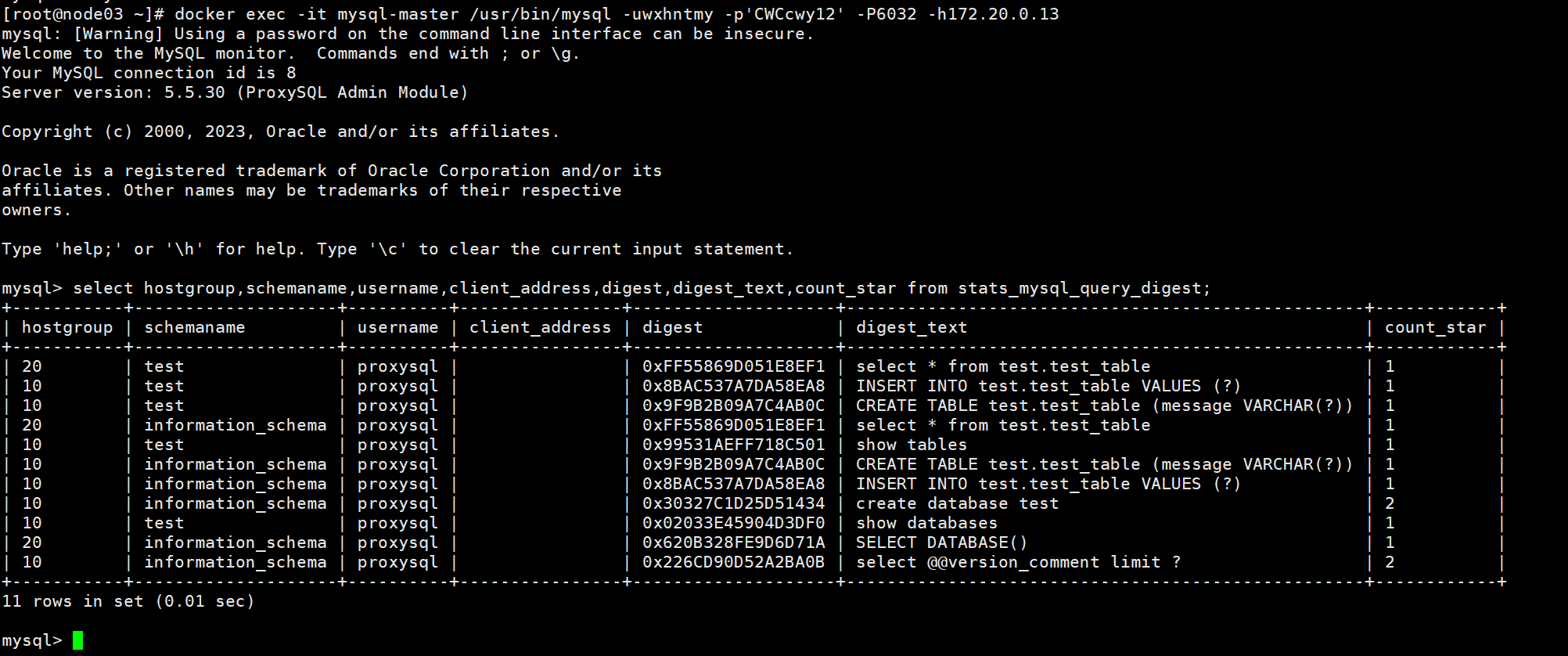docker network create --subnet=172.20.0.0/16 mysql-network docker network ls

mkdir -p /data/mysql-master/{conf,data,log}
mkdir -p /data/mysql-slave1/{conf,data,log}
mkdir -p /data/mysql-slave2/{conf,data,log}
创建日志
touch /data/mysql-{master,slave1,slave2}/log/mysqld-error.log
chown 999:999 /data/mysql-{master,slave1,slave2}/log/*
chmod 755 /data/mysql-{master,slave1,slave2}/log/*
touch /data/mysql-master/conf/my.cnf && chown 999:999 /data/mysql-master/conf/my.cnf
[mysqld] server-id=1 pid-file= /var/run/mysqld/mysqld.pid socket= /var/run/mysqld/mysqld.sock datadir= /var/lib/mysql log-error= /var/log/mysqld-error.log slow-query-log-file= /var/log/slow-query.log user=mysql port=3306 lower_case_table_names=1 max_allowed_packet=400M log_bin_trust_function_creators=1 max_connections=1000 explicit_defaults_for_timestamp=1 # 时区 default-time_zone = '+8:00' sql_mode='STRICT_TRANS_TABLES,NO_ZERO_IN_DATE,NO_ZERO_DATE,ERROR_FOR_DIVISION_BY_ZERO,NO_AUTO_CREATE_USER,NO_ENGINE_SUBSTITUTION' innodb_buffer_pool_size=1G innodb_log_file_size=256M innodb_flush_log_at_trx_commit=1 innodb_flush_method=O_DIRECT innodb_autoinc_lock_mode=2 innodb_flush_log_at_trx_commit=0 #binlog expire_logs_days=7 log-bin=mysql-bin binlog-format=ROW #指定默认引擎 disabled_storage_engines=MyISAM,BLACKHOLE,FEDERATED,CSV,ARCHIVE default_storage_engine=innodb symbolic-links=0 init_connect='SET collation_connection = utf8_unicode_ci' init_connect='SET NAMES utf8' character-set-server=utf8 collation-server=utf8_unicode_ci skip-character-set-client-handshake [client] default-character-set=utf8 [mysql] default-character-set=utf8
docker run --name mysql-master --net mysql-network --ip 172.20.0.10 \ -v /data/mysql-master/conf/my.cnf:/etc/my.cnf \ -v /data/mysql-master/log:/var/log/ \ -v /data/mysql-master/data:/var/lib/mysql \ -e TZ="Asia/Shanghai" \ -e MYSQL_ROOT_PASSWORD=CWCcwy12 \ -d mysql:5.7.39
touch /data/mysql-slave1/conf/my.cnf && chown 999:999 /data/mysql-slave1/conf/my.cnf vim /data/mysql-slave1/conf/my.cnf
[mysqld] server-id=2 pid-file= /var/run/mysqld/mysqld.pid socket= /var/run/mysqld/mysqld.sock datadir= /var/lib/mysql log-error= /var/log/mysqld-error.log slow-query-log-file= /var/log/slow-query.log user=mysql port=3306 lower_case_table_names=1 max_allowed_packet=400M log_bin_trust_function_creators=1 max_connections=1000 explicit_defaults_for_timestamp=1 # 时区 default-time_zone = '+8:00' sql_mode='STRICT_TRANS_TABLES,NO_ZERO_IN_DATE,NO_ZERO_DATE,ERROR_FOR_DIVISION_BY_ZERO,NO_AUTO_CREATE_USER,NO_ENGINE_SUBSTITUTION' innodb_buffer_pool_size=1G innodb_log_file_size=256M innodb_flush_log_at_trx_commit=1 innodb_flush_method=O_DIRECT innodb_autoinc_lock_mode=2 innodb_flush_log_at_trx_commit=0 #从库设置为只读,不设置的话,proxysql会设置为可写 read_only=1 #binlog expire_logs_days=7 log-bin=mysql-bin binlog-format=ROW #指定默认引擎 disabled_storage_engines=MyISAM,BLACKHOLE,FEDERATED,CSV,ARCHIVE default_storage_engine=innodb symbolic-links=0 init_connect='SET collation_connection = utf8_unicode_ci' init_connect='SET NAMES utf8' character-set-server=utf8 collation-server=utf8_unicode_ci skip-character-set-client-handshake [client] default-character-set=utf8 [mysql] default-character-set=utf8
docker run --name mysql-slave1 --net mysql-network --ip 172.20.0.11 \ -v /data/mysql-slave1/conf/my.cnf:/etc/my.cnf \ -v /data/mysql-slave1/log:/var/log/ \ -v /data/mysql-slave1/data:/var/lib/mysql \ -e TZ="Asia/Shanghai" \ -e MYSQL_ROOT_PASSWORD=CWCcwy12 \ -d mysql:5.7.39
touch /data/mysql-slave2/conf/my.cnf && chown 999:999 /data/mysql-slave2/conf/my.cnf vim /data/mysql-slave2/conf/my.cnf
[mysqld] server-id=3 pid-file= /var/run/mysqld/mysqld.pid socket= /var/run/mysqld/mysqld.sock datadir= /var/lib/mysql log-error= /var/log/mysqld-error.log slow-query-log-file= /var/log/slow-query.log user=mysql port=3306 lower_case_table_names=1 max_allowed_packet=400M log_bin_trust_function_creators=1 max_connections=1000 explicit_defaults_for_timestamp=1 # 时区 default-time_zone = '+8:00' sql_mode='STRICT_TRANS_TABLES,NO_ZERO_IN_DATE,NO_ZERO_DATE,ERROR_FOR_DIVISION_BY_ZERO,NO_AUTO_CREATE_USER,NO_ENGINE_SUBSTITUTION' innodb_buffer_pool_size=1G innodb_log_file_size=256M innodb_flush_log_at_trx_commit=1 innodb_flush_method=O_DIRECT innodb_autoinc_lock_mode=2 innodb_flush_log_at_trx_commit=0 #从库设置为只读,不设置的话,proxysql会设置为可写 read_only=1 #binlog expire_logs_days=7 log-bin=mysql-bin binlog-format=ROW #指定默认引擎 disabled_storage_engines=MyISAM,BLACKHOLE,FEDERATED,CSV,ARCHIVE default_storage_engine=innodb symbolic-links=0 init_connect='SET collation_connection = utf8_unicode_ci' init_connect='SET NAMES utf8' character-set-server=utf8 collation-server=utf8_unicode_ci skip-character-set-client-handshake [client] default-character-set=utf8 [mysql] default-character-set=utf8
docker run --name mysql-slave2 --net mysql-network --ip 172.20.0.12 \ -v /data/mysql-slave2/conf/my.cnf:/etc/my.cnf \ -v /data/mysql-slave2/log:/var/log/ \ -v /data/mysql-slave2/data:/var/lib/mysql \ -e TZ="Asia/Shanghai" \ -e MYSQL_ROOT_PASSWORD=CWCcwy12 \ -d mysql:5.7.39

docker exec -it mysql-master /usr/bin/mysql -uroot -p'CWCcwy12' # 创建用于主从同步的用户 grant all on *.* TO 'wxhntmy'@"%" identified by "CWCcwy12"; flush privileges; use mysql; select host,user from user; show master status\G
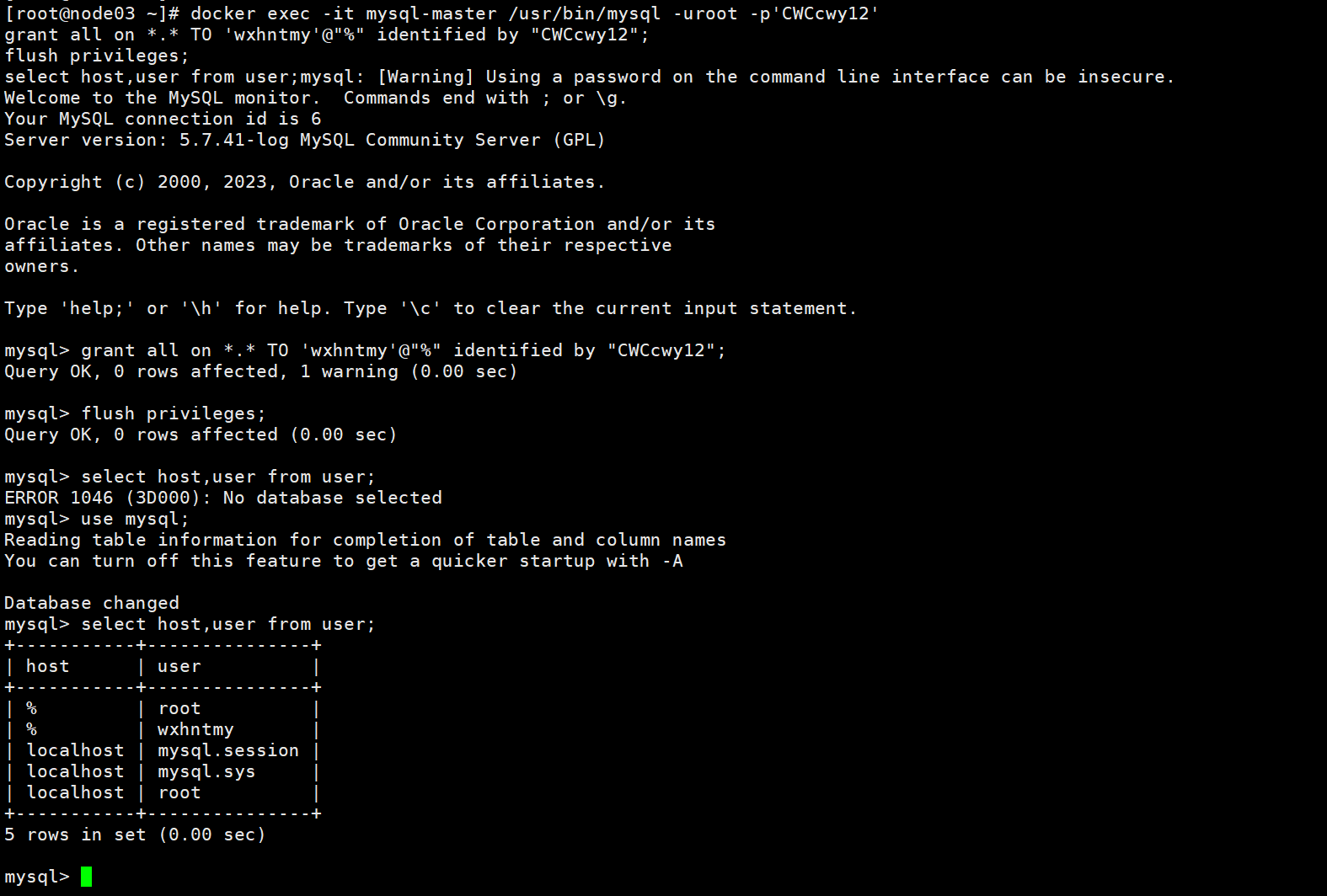

docker exec -it mysql-slave1 /usr/bin/mysql -uroot -p'CWCcwy12' CHANGE MASTER TO MASTER_HOST = '172.20.0.10', MASTER_USER = 'wxhntmy',MASTER_PASSWORD = 'CWCcwy12'; start slave; show slave status\G
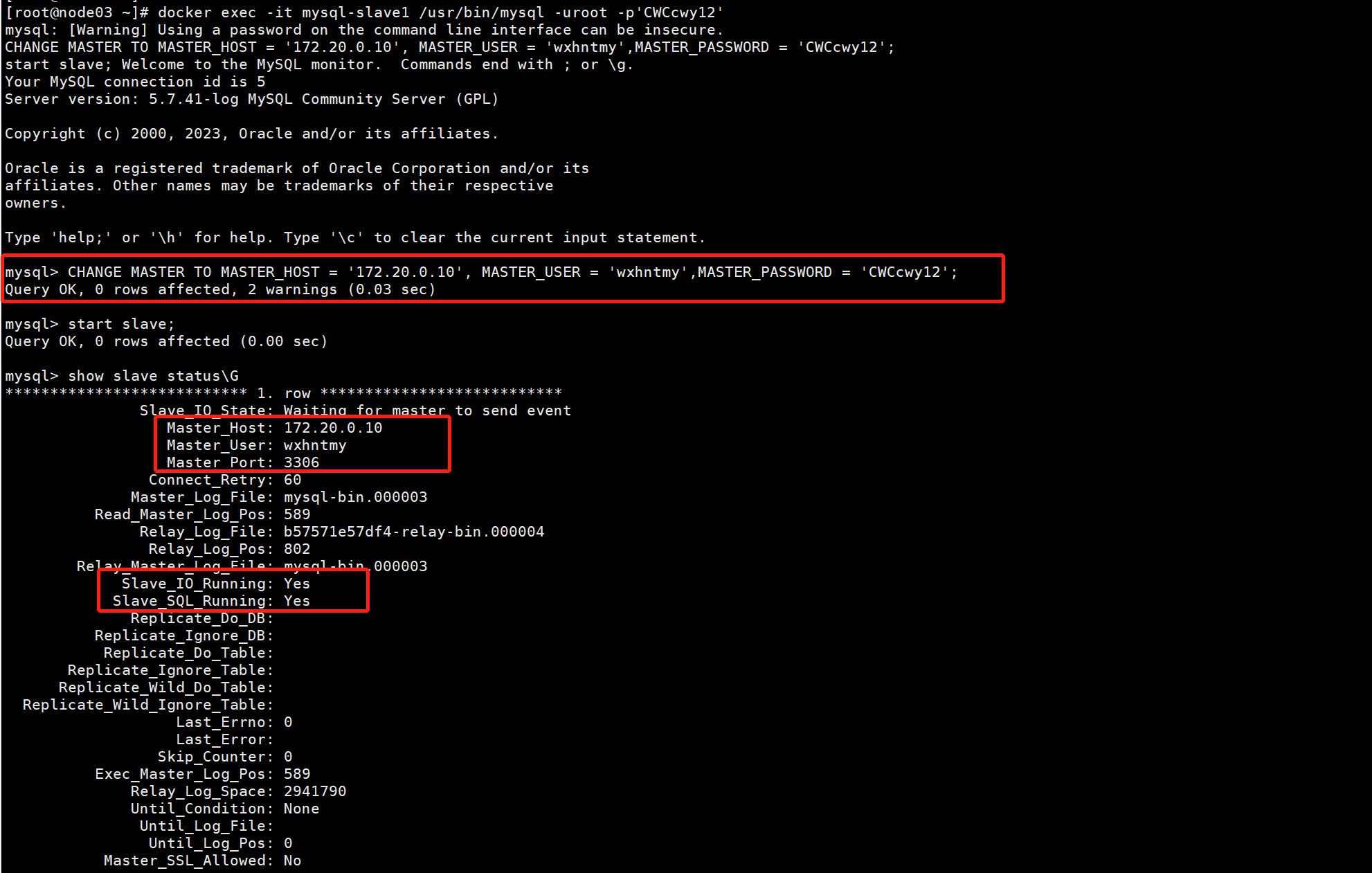
docker exec -it mysql-slave2 /usr/bin/mysql -uroot -p'CWCcwy12' CHANGE MASTER TO MASTER_HOST = '172.20.0.10', MASTER_USER = 'wxhntmy',MASTER_PASSWORD = 'CWCcwy12'; start slave; show slave status\G
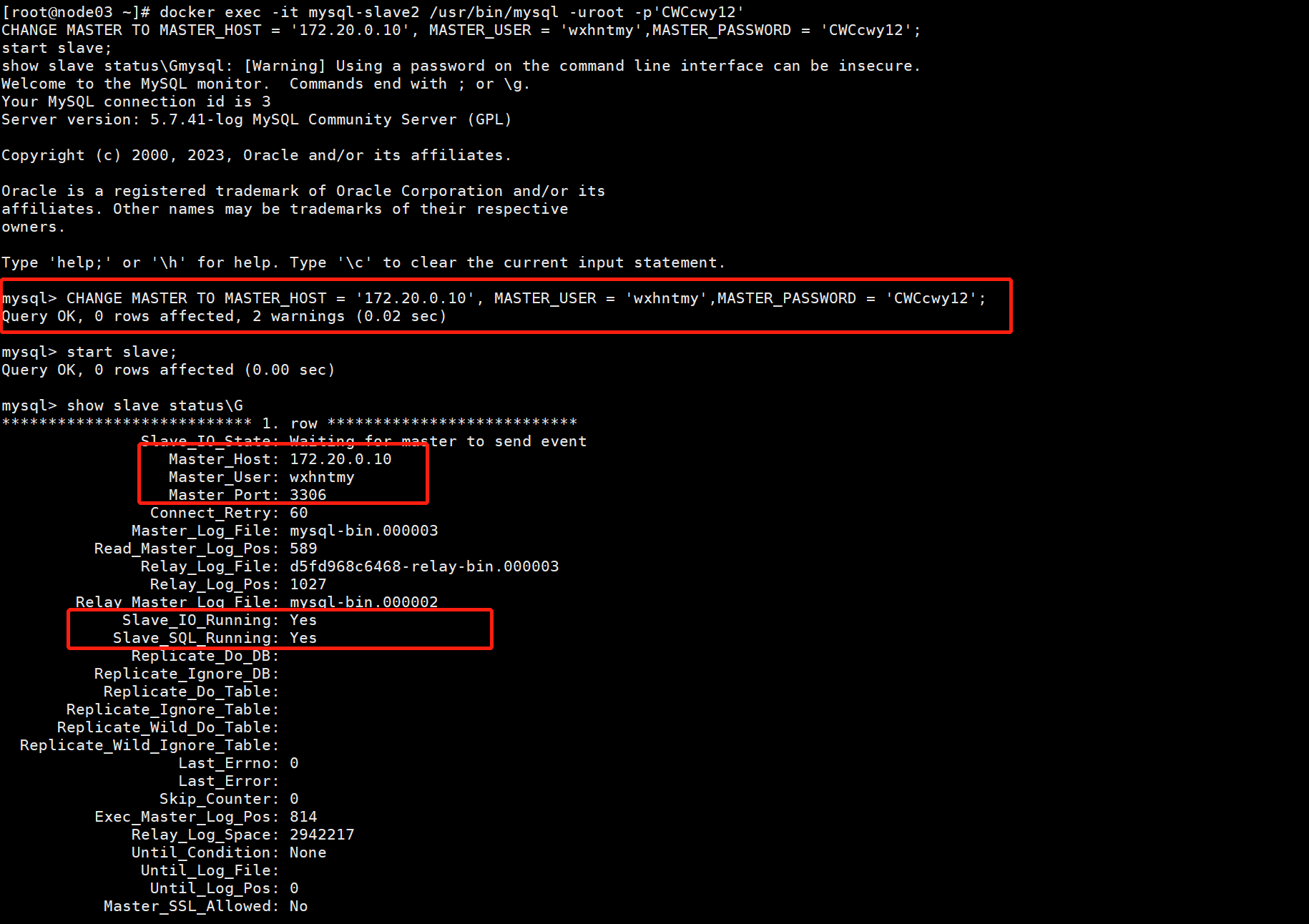
mkdir -p /data/proxysql/{conf,data}
touch /data/proxysql/conf/proxysql.cnf && vim /data/proxysql/conf/proxysql.cnf
#file proxysql.cfg
########################################################################################
# This config file is parsed using libconfig , and its grammar is described in:
# http://www.hyperrealm.com/libconfig/libconfig_manual.html#Configuration-File-Grammar
# Grammar is also copied at the end of this file
########################################################################################
########################################################################################
# IMPORTANT INFORMATION REGARDING THIS CONFIGURATION FILE:
########################################################################################
# On startup, ProxySQL reads its config file (if present) to determine its datadir.
# What happens next depends on if the database file (disk) is present in the defined
# datadir (i.e. "/var/lib/proxysql/proxysql.db").
#
# If the database file is found, ProxySQL initializes its in-memory configuration from
# the persisted on-disk database. So, disk configuration gets loaded into memory and
# then propagated towards the runtime configuration.
#
# If the database file is not found and a config file exists, the config file is parsed
# and its content is loaded into the in-memory database, to then be both saved on-disk
# database and loaded at runtime.
#
# IMPORTANT: If a database file is found, the config file is NOT parsed. In this case
# ProxySQL initializes its in-memory configuration from the persisted on-disk
# database ONLY. In other words, the configuration found in the proxysql.cnf
# file is only used to initial the on-disk database read on the first startup.
#
# In order to FORCE a re-initialise of the on-disk database from the configuration file
# the ProxySQL service should be started with "systemctl start proxysql-initial".
#
########################################################################################
datadir="/var/lib/proxysql"
errorlog="/var/lib/proxysql/proxysql.log"
admin_variables=
{
#配置可以外网访问的管理员
admin_credentials="wxhntmy:CWCcwy12"
# mysql_ifaces="127.0.0.1:6032;/tmp/proxysql_admin.sock"
mysql_ifaces="0.0.0.0:6032"
# refresh_interval=2000
# debug=true
}
mysql_variables=
{
threads=4
max_connections=2048
default_query_delay=0
default_query_timeout=36000000
have_compress=true
poll_timeout=2000
# interfaces="0.0.0.0:6033;/tmp/proxysql.sock"
interfaces="0.0.0.0:6033"
default_schema="information_schema"
stacksize=1048576
#数据库版本号
server_version="5.7.39"
connect_timeout_server=3000
# make sure to configure monitor username and password
# https://github.com/sysown/proxysql/wiki/Global-variables#mysql-monitor_username-mysql-monitor_password
#监控健康状态的用户
monitor_username="monitor"
monitor_password="CWCcwy12"
monitor_history=600000
monitor_connect_interval=60000
monitor_ping_interval=10000
monitor_read_only_interval=1500
monitor_read_only_timeout=500
ping_interval_server_msec=120000
ping_timeout_server=500
commands_stats=true
sessions_sort=true
connect_retries_on_failure=10
# 激活时(2.0.6版本中的默认设置),如果SET语句用于多语句命令,或者SET语句解析不成功,
# 则多路复用和查询路由都将被禁用。客户端将保持绑定到单个后端连接。
# ProxySQL不理解的任何SET语句都将禁用多路复用和路由。
set_query_lock_on_hostgroup=0
}
# defines all the MySQL servers
#MySQL节点,这里host是根据mysql的无头服务
mysql_servers =
(
{
address= "172.20.0.10",
port=3306,
hostgroup=10,
max_connections=100
},
{
address= "172.20.0.11",
port=3306,
hostgroup=20,
max_connections=100
},
{
address= "172.20.0.12",
port=3306,
hostgroup=20,
max_connections=100
}
# {
# address = "127.0.0.1" # no default, required . If port is 0 , address is interpred as a Unix Socket Domain
# port = 3306 # no default, required . If port is 0 , address is interpred as a Unix Socket Domain
# hostgroup = 0 # no default, required
# status = "ONLINE" # default: ONLINE
# weight = 1 # default: 1
# compression = 0 # default: 0
# max_replication_lag = 10 # default 0 . If greater than 0 and replication lag passes such threshold, the server is shunned
# },
# {
# address = "/var/lib/mysql/mysql.sock"
# port = 0
# hostgroup = 0
# },
# {
# address="127.0.0.1"
# port=21891
# hostgroup=0
# max_connections=200
# },
# { address="127.0.0.2" , port=3306 , hostgroup=0, max_connections=5 },
# { address="127.0.0.1" , port=21892 , hostgroup=1 },
# { address="127.0.0.1" , port=21893 , hostgroup=1 }
# { address="127.0.0.2" , port=3306 , hostgroup=1 },
# { address="127.0.0.3" , port=3306 , hostgroup=1 },
# { address="127.0.0.4" , port=3306 , hostgroup=1 },
# { address="/var/lib/mysql/mysql.sock" , port=0 , hostgroup=1 }
)
# defines all the MySQL users
#MySQL的用户
mysql_users:
(
{
username = "proxysql" ,
password = "CWCcwy12" ,
default_hostgroup = 10,
transaction_persistent = 0,
active = 1
}
# {
# username = "username" # no default , required
# password = "password" # default: ''
# default_hostgroup = 0 # default: 0
# active = 1 # default: 1
# },
# {
# username = "root"
# password = ""
# default_hostgroup = 0
# max_connections=1000
# default_schema="test"
# active = 1
# },
# { username = "user1" , password = "password" , default_hostgroup = 0 , active = 0 }
)
#defines MySQL Query Rules
mysql_query_rules:
(
#select * from tb for update 这样的语句是会修改数据的,
# 所以需要单独定义,将它路由至 hostgroup_id=10 的组 (写组)
{
rule_id=1
active=1
match_digest= "(?i)^(?!SELECT).*$"
destination_hostgroup=10
apply=1
},
# 将 select 查询语句全部路由至 hostgroup_id=20 的组 (读组)
#其他没有被规则匹配到的组将会被路由至用户默认的组 (mysql_users 表中的 default_hostgroup)
{
rule_id=2
active=1
match_digest= "(?i)^SELECT.*$"
destination_hostgroup=20
apply=1
}
# {
# rule_id=1
# active=1
# match_pattern="^SELECT .* FOR UPDATE$"
# destination_hostgroup=0
# apply=1
# },
# {
# rule_id=2
# active=1
# match_pattern="^SELECT"
# destination_hostgroup=1
# apply=1
# }
)
scheduler=
(
# {
# id=1
# active=0
# interval_ms=10000
# filename="/var/lib/proxysql/proxysql_galera_checker.sh"
# arg1="0"
# arg2="0"
# arg3="0"
# arg4="1"
# arg5="/var/lib/proxysql/proxysql_galera_checker.log"
# }
)
mysql_replication_hostgroups=
(
{
writer_hostgroup=10
reader_hostgroup=20
comment="proxysql-cluster"
}
# {
# writer_hostgroup=50
# reader_hostgroup=60
# comment="test repl 2"
# }
)
proxysql_servers =
(
# {
# hostname = "172.20.0.13" ,
# port = 6032,
# weight = 1
# },
# {
# hostname = "172.20.0.14" ,
# port = 6032,
# weight = 1
# }
)
# http://www.hyperrealm.com/libconfig/libconfig_manual.html#Configuration-File-Grammar
#
# Below is the BNF grammar for configuration files. Comments and include directives are not part of the grammar, so they are not included here.
#
# configuration = setting-list | empty
#
# setting-list = setting | setting-list setting
#
# setting = name (":" | "=") value (";" | "," | empty)
#
# value = scalar-value | array | list | group
#
# value-list = value | value-list "," value
#
# scalar-value = boolean | integer | integer64 | hex | hex64 | float
# | string
#
# scalar-value-list = scalar-value | scalar-value-list "," scalar-value
#
# array = "[" (scalar-value-list | empty) "]"
#
# list = "(" (value-list | empty) ")"
#
# group = "{" (setting-list | empty) "}"
#
# empty =
docker run --name proxysql -p 6032:6032 -p 6033:6033 -p 6070:6070 -d \ --net mysql-network --ip 172.20.0.13 \ -v /data/proxysql/conf/proxysql.cnf:/etc/proxysql.cnf \ -v /data/proxysql/data:/var/lib/proxysql/ \ proxysql/proxysql:latest
docker exec -it mysql-master /usr/bin/mysql -uroot -p'CWCcwy12' # 为 ProxySQL 创建读写账号 grant all on *.* to 'proxysql'@'%' identified by 'CWCcwy12'; grant select on *.* to 'monitor'@'%' IDENTIFIED BY 'CWCcwy12'; flush privileges; use mysql; select host,user from user;
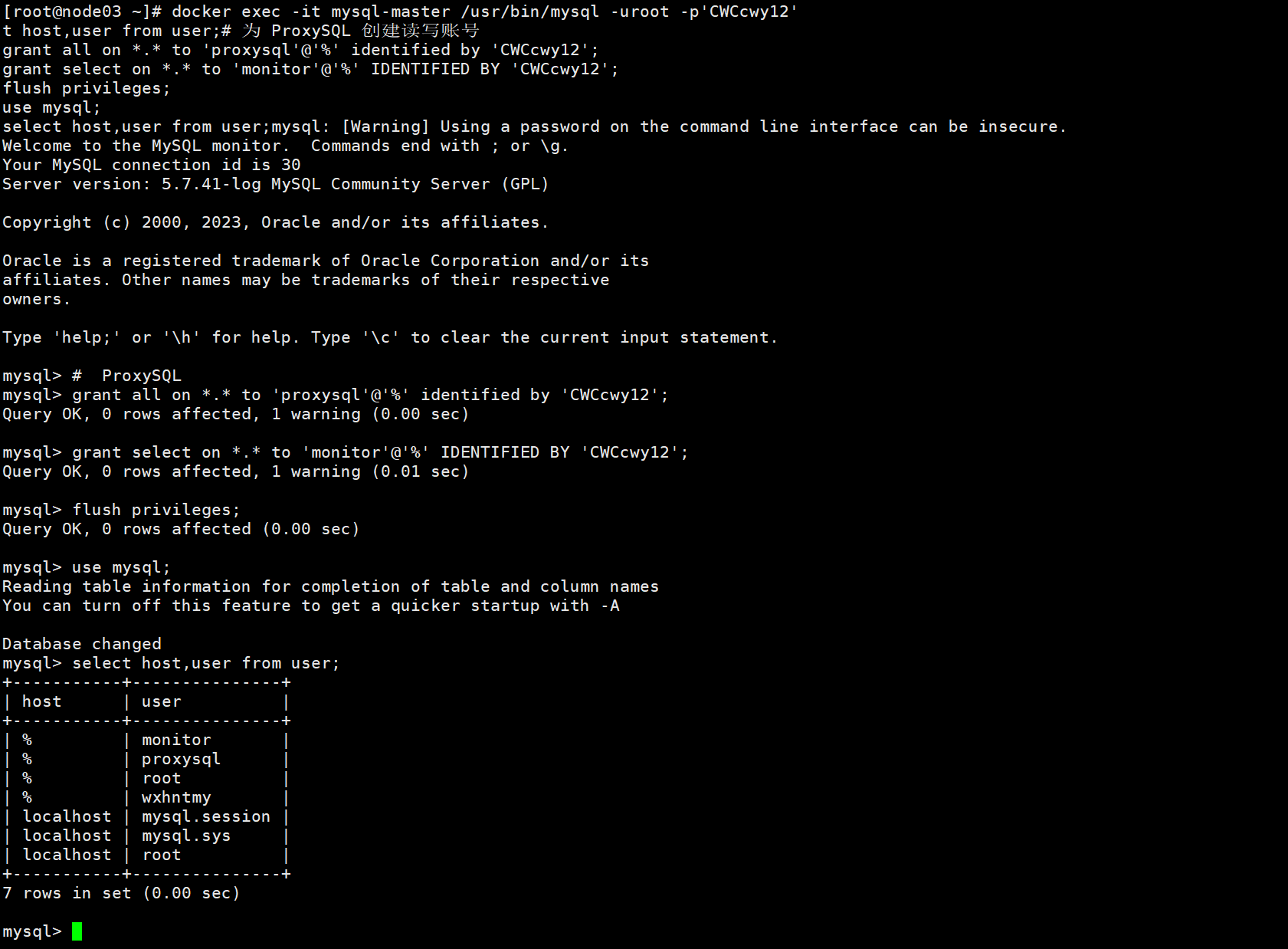
# 此处要用proxysql.cnf配置的管理员 docker exec -it mysql-master /usr/bin/mysql -uwxhntmy -p'CWCcwy12' -P6032 -h172.20.0.13

# MySQL服务 select * from mysql_servers; # mysql用户 select * from mysql_users; # 查看路由规则 select rule_id,active,match_digest,destination_hostgroup,apply from mysql_query_rules;
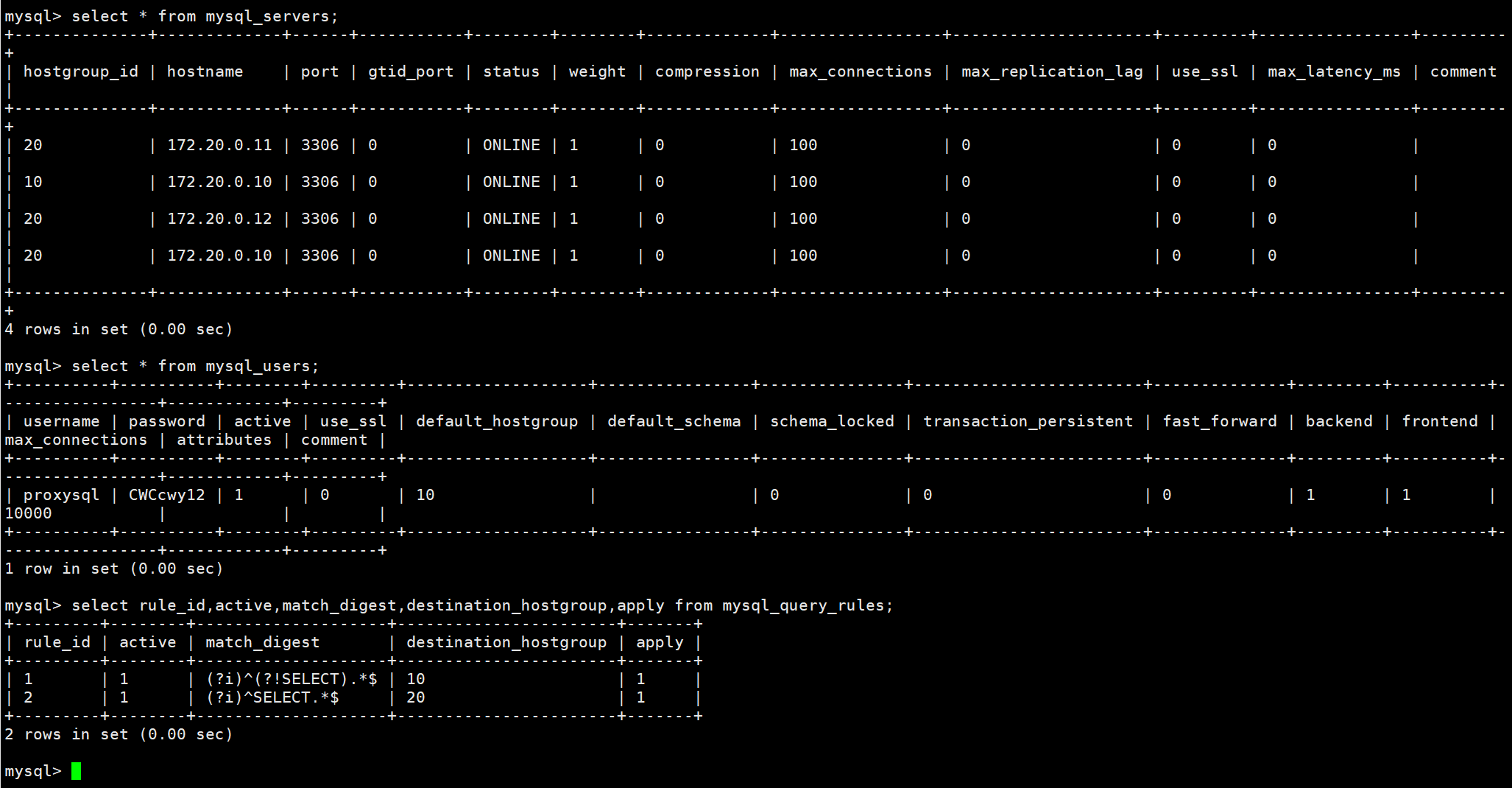
登录 6033 SQL 运行端运行 SQL
# 此处要用mysql的用户 docker exec -it mysql-master /usr/bin/mysql -uproxysql -p'CWCcwy12' -P6033 -h172.20.0.13
验证读写分离
create database test;
use test;
CREATE TABLE test.test_table (message VARCHAR(250));
INSERT INTO test.test_table VALUES ('hello');
select * from test.test_table;
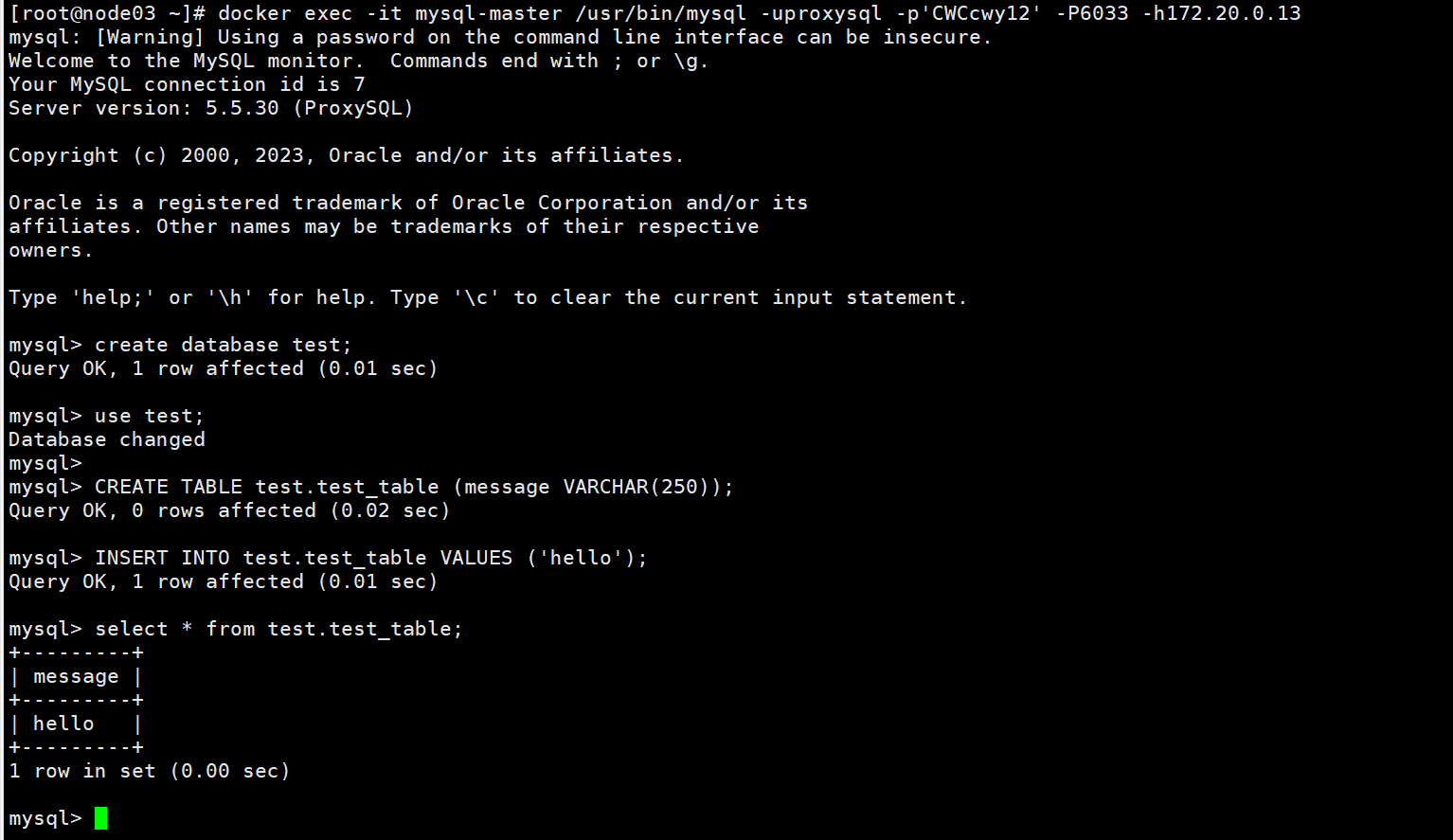
登录 6032 管理端查看审计日志
# 此处要用proxysql.cnf配置的管理员 docker exec -it mysql-master /usr/bin/mysql -uwxhntmy -p'CWCcwy12' -P6032 -h172.20.0.13
# 查看SQL运行状况 select hostgroup,schemaname,username,client_address,digest,digest_text,count_star from stats_mysql_query_digest;
